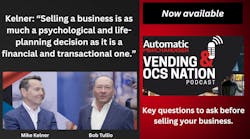M&A best practices for operators: how to gain leverage at the bargaining table
“Best practices” is a term that’s always open for discussion, but after four decades as a sell-side business broker, experience has helped guide me toward what a best practice should look like.
In the first three installments of this series on best practices, I wrote about:
- The importance of preparation
- Why a proper valuation is critical
- How to successfully market your business for sale
Part four is all about negotiation, a very important aspect of a business sale.
Before I get into the one key factor that makes negotiation a breeze for the seller, consider the issues that are commonly negotiated in the course of the transaction. These issues need to be considered carefully by a seller.
Purchase price
So many factors determine the price: the market area, product mix, account mix, revenue amount, equipment, technology, the number of contracts in place, and — very importantly —the gross profit a business is generating.
Preparation (part one of the series) and valuation (part two of the series) go a long way toward establishing the appropriate selling price. Why is gross profit important? It provides important insights into a company’s operational capability and the profitability of its core business.
Employee considerations
To what extent does the seller want to guarantee job safety to some or even all of their employees for a specific period of time? This is a common item up for negotiation, and the importance of the issue should be considered carefully by the seller. This isn’t necessarily a tough issue because smart buyers are typically anxious to retain valuable employees. In fact, I spoke to a frequent business buyer recently who told me that a key upside to buying an operation can be the discovery of “hidden gems” among the staff — people who can be found at every level of the company org chart.
Deal structure
How a company is sold can have significant tax implications for a seller. Will it be an asset sale or a stock sale? This must be determined during the preparation process (part one), and once a seller consults with their tax advisor, the answer should be clear.
Real estate
If the seller is fortunate enough to own real estate associated with their business and wants to make that part of the transaction, a business broker can assist, advise and help facilitate the discussion and the transaction as part of the overall deal. By law, a business broker cannot act as the broker for the real estate transaction. However, I make myself available as an extra set of ears for the seller, as an observer with plenty of experience.
Payment terms
Will there be a holdback of a portion of the selling price over a period? Will there be an upside for the seller if certain pending deals close within a designated period?
Seller’s role after the sale
Some sellers are ready to ride into the sunset on the day of the sale. Some want an active role in the company, which can be seen as positive or negative by the buyer. Regardless, this issue is something that needs to be pre-determined by the seller and is always subject to negotiation with the buyer.
As a sell-side intermediary, I consider it very important to know exactly where my client stands before we market the company. With an understanding of the seller’s objectives, goals, financial condition and plans for after the sale, I can represent their needs properly and negotiate effectively on their behalf.
The key to easy negotiations
One key factor makes negotiations a breeze: having multiple offers. With multiple buyers seeking to buy your business, as a seller, you have tremendous leverage.
How does that happen? Multiple offers come from months of preparation, a thorough and accurate valuation, a seller who is willing to follow advice and take necessary steps — several months before the company is put on the market — along with a perfectly executed marketing plan.
History on our side
Another good reason for an operator to use a sell-side intermediary is that well-established business brokers have the advantage of history and experience on our side. We know what the major buyers are expecting, what their documents look like, what they have agreed to in the past, their objectives and where they draw a line in the sand.
DIY: Not the way to go
Hopefully, this series has convinced operators of at least one thing for sure: Selling your company is not a do-it-yourself proposition. Instead, get proper representation and enjoy multiple offers, negotiation leverage and a business sale that allows you to comfortably move on to your next chapter.
Catch up on Mike's full M&A series
About the Author
Mike Kelner
Senior Business Intermediary, Vending Biz Broker
Mike Kelner is the founder and president of VBB Advisors, a full-service merger and acquisition firm serving the vending, office coffee and bottled water industries. Mike has been a senior business intermediary in the refreshment services industry for over 30 years, representing sellers exclusively. He is a Certified Business Intermediary and Value Builder Advisor.
Mike can be reached at [email protected] or 704-942-4621.







